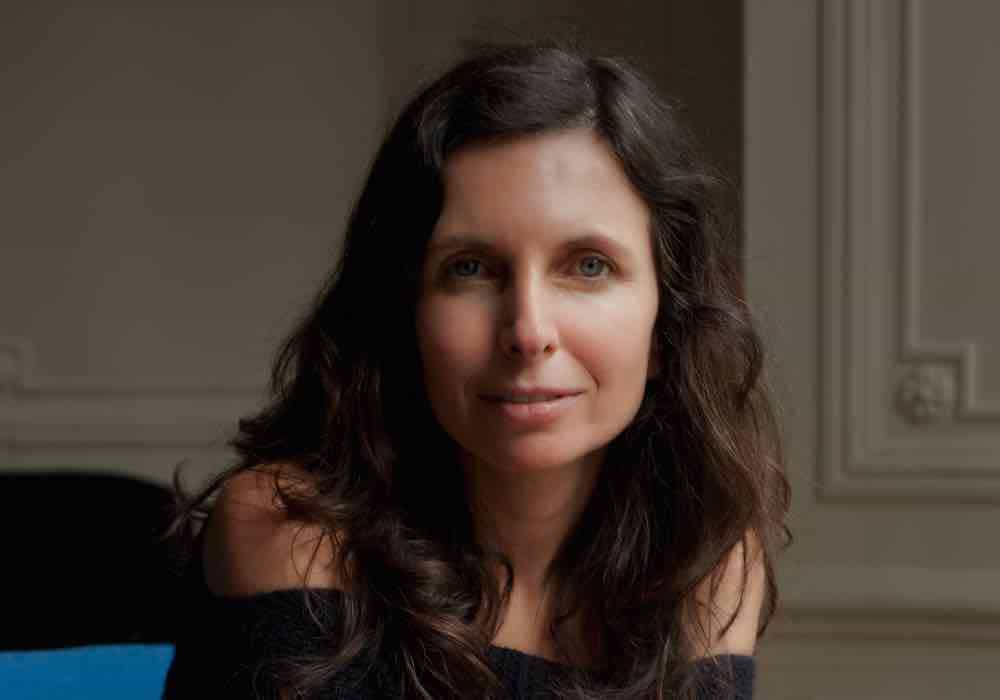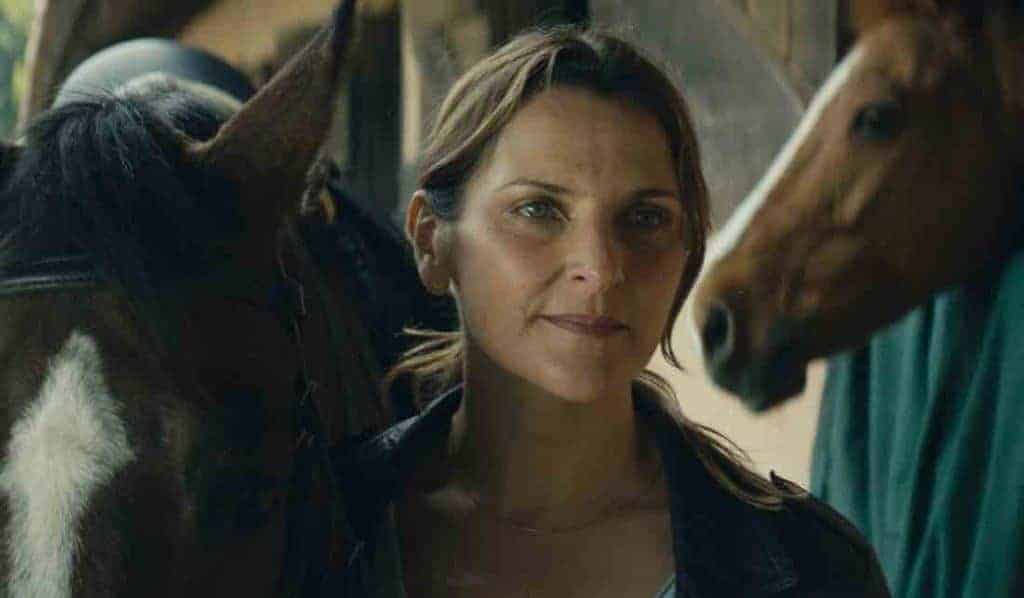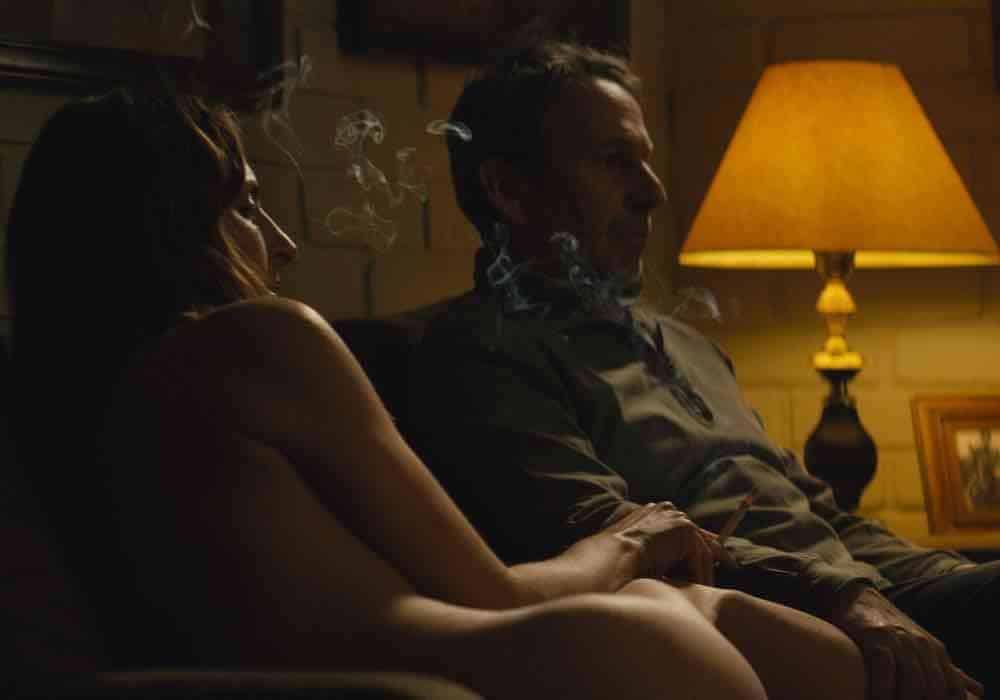
Presented in Critics’ Week, Chilean director Marcela Said’s Los Perros is part of a welcome resurgence of political films at the Cannes Film Festival. Free-spirited, sexually liberated Mariana develops a relationship with her riding teacher Juan. When she learns that he is being prosecuted for crimes committed as a serviceman under Pinochet, she recklessly seeks to uncover the truth. But she has no idea how deep corruption runs and will find her own sense of identity shaken to its core. Like several other films in Cannes, Los Perros refreshingly reminds us of the impossibility to divide between the personal and the political, between everyday life and politics.
I talked to director Marcela Said about creating realistic female characters, taking risks and defying expectations.
Seventh Row (7R): How did you construct the character of Mariana, the lead? She is complex, full of contradictions.
Marcela Said (MS): I think that all women have contradictions, but characters — male and female — in cinema are very often portrayed as either good or bad people, with just a few characteristics or personality traits. It’s interesting to show how each of us is capable of doing things we couldn’t even imagine. I like people who are unpredictable. I think a woman should be allowed to be unpredictable, to have doubts, to wonder — to one day say yes, and another say no. To lie sometimes — how many little white lies do we all tell everyday? I wanted to put all that on screen. I wanted a character that was more real than what we’re used to seeing.
[clickToTweet tweet=”‘As women, we take risks that men do not take. And I love risks.’ – Marcela Said” quote=”As women, we take risks that men do not take. And I love risks.”]

7R: Did you encounter some difficulties trying to create this highly unusual character?
MS: Oh yes, many. Someone told me “the movie you’re making, it’s very dicey.” The topic is dangerous and improper. The character isn’t sympathetic right away.
People didn’t really want to finance my film. They prefer classic heroines, characters who go through a real journey… But I thought well, not all women go on a real trip! Sometimes we arrive somewhere, then realise we don’t like it, so we just go back!
When you want to create a character like this, people often tell you “no.” But maybe that’s also a characteristic of the cinema made by women. As women, we take risks that men do not take. And I love risks. When I started the film, I knew it was a risky subject, even more so for a second feature.
[clickToTweet tweet=”‘Being selected in Critics’ Week was a way of telling me, ‘You made it! Your film is good.” -Said” quote=”Being selected in Critics’ Week was a way of telling me, ‘You made it! Your film is good.'”]
That’s why it was important for me to be selected in Critics’ Week. It was a way of telling me, “You made it! Your film is good. It’s interesting, and we do understand the character of Mariana.” Someone told me, “It’s funny, at the beginning of the film, I didn’t understand her. But later, it’s as though I was put into her shoes, I was with her, and I started understanding her.” Women tend to understand her better than men do.
7R: It’s a very liberating character, she’s not afraid of changing her mind and of frustrating others, especially men. She doesn’t care if other people don’t like what she does or says.
MS: Yes, because she’s also a woman looking for freedom, if you look closely. She tries to free herself from a lot of things. She tries to be free with her body. She is comfortable with her sexuality, yet she is also sexually abused — her path is tortuous. But her profound desire to liberate herself is always honest, even if she doesn’t succeed. The most important thing is that she tries, not whether she succeeds or not.
[clickToTweet tweet=”‘She presents herself as this really strong woman when in fact, she is not that strong.’ – Said” quote=”She presents herself as this really strong woman when in fact, she is not that strong.”]
Also, the fact that she betrays. People often ask me ‘how could she do that?’ but she was going to betray him from the start. She presents herself as this really strong woman when in fact, she is not that strong. But she’s also not that fragile. For the film’s French title, I was thinking of using ‘Une femme pas si fragile’ (not such a fragile woman), but it could also be ‘Une femme pas si forte” (not such a strong woman).
[clickToTweet tweet=”‘The most important thing is that she tries, not whether she succeeds or not.’ – Marcela Said” quote=”The most important thing is that she tries, not whether she succeeds or not.”]

7R: The personal is political in the film. There is no separation between Mariana’s political beliefs and the way she conducts her everyday life.
MS: I knew the way the political and the personal were so mixed and mingled together was going to be a little shocking, but that’s why I thought it would be interesting. She was never going to be a heroine restoring justice. But one of the film’s raciest sequences was the one by the pool, when she has a conversation with the colonel. It’s a very risqué scene. While they’re talking about something political, strong, emotional, and terrible, at the same time, there is this intense sexuality, with him looking at her naked body… There’s all this sexuality as well, because we, as human beings, are all of these things simultaneously.
7R: She also strips in front of him to provoke him.
MS: Yes, she’s very provocative.
Read Elena Lazic’s review of Los Perros here.
Read the rest of our Cannes Film Festival coverage here.

